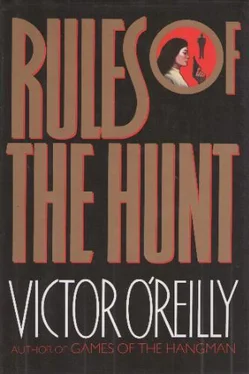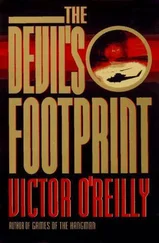Victor O'Reilly - Rules of The Hunt
Здесь есть возможность читать онлайн «Victor O'Reilly - Rules of The Hunt» весь текст электронной книги совершенно бесплатно (целиком полную версию без сокращений). В некоторых случаях можно слушать аудио, скачать через торрент в формате fb2 и присутствует краткое содержание. Жанр: Триллер, на английском языке. Описание произведения, (предисловие) а так же отзывы посетителей доступны на портале библиотеки ЛибКат.
- Название:Rules of The Hunt
- Автор:
- Жанр:
- Год:неизвестен
- ISBN:нет данных
- Рейтинг книги:4 / 5. Голосов: 1
-
Избранное:Добавить в избранное
- Отзывы:
-
Ваша оценка:
- 80
- 1
- 2
- 3
- 4
- 5
Rules of The Hunt: краткое содержание, описание и аннотация
Предлагаем к чтению аннотацию, описание, краткое содержание или предисловие (зависит от того, что написал сам автор книги «Rules of The Hunt»). Если вы не нашли необходимую информацию о книге — напишите в комментариях, мы постараемся отыскать её.
Rules of The Hunt — читать онлайн бесплатно полную книгу (весь текст) целиком
Ниже представлен текст книги, разбитый по страницам. Система сохранения места последней прочитанной страницы, позволяет с удобством читать онлайн бесплатно книгу «Rules of The Hunt», без необходимости каждый раз заново искать на чём Вы остановились. Поставьте закладку, и сможете в любой момент перейти на страницу, на которой закончили чтение.
Интервал:
Закладка:
The occupation of Korea was not one of the high points in Japanese history. Japan had annexed the country in 1910, and for the next thirty-six years Korea had been subject to an arbitrary and frequently brutal Japanese military-dominated regime.
"In Korea, Hodama worked extensively for the authorities and specialized in putting down resistance. Mostly, he worked behind the scenes. He organized gangs of thugs to beat up or kill Koreans who wanted independence, thus enabling the administration to pretend they were not involved in the more extreme acts of repression.
"Hodama returned to Japan in the 1920's. The world was in recession. That was a period when there was major conflict in Japan between democratic government and the ultraright headed by the military. Since the moderates could not seem to do anything about fundamental issues like feeding the people, it is scarcely surprising that the rightists won out. The same thing happened elsewhere – in Germany, Italy, Spain, and Portugal. Empty rice bowls are not good for democracy."
"That was a period of secret societies and assassinations," said Adachi. "Various moderate government ministers were assassinated. Wasn't Hodama involved in all that?"
"So it is rumored," said Chifune. "Whether he did any of the actual killing, we don't know. Anyway, for plotting to assassinate Prime Minister Admiral Saito, Hodama was actually sent to prison by the moderate regime in 1934, and served over three years, but then he was let out when the extremists took over. And, of course, having been in prison for the cause put him right in there with the new regime. His rightist and nationalist credentials were impeccable. He had endless contacts in government and in the military and through the various secret societies he was involved with. From then on, he was into everything – but always operating behind the scenes. He was already a kuromaku."
Kuromaku, thought Adachi. The word had a sinister ring. There was a long tradition of such figures in Japanese life. Kuromaku literally meant ‘black curtain,’ a reference to classic Kabuki theatre, where a concealed wire-puller controlled the action on the stage from behind a black curtain. The English equivalent would perhaps be godfather or string-puller or kingmaker, but a kuromaku was more than all these. The word implied a person of very special caliber, and more recently it suggested links to both organized crime and politics at the highest level. Above all, the very sound represented power.
"Into everything?" said Adachi. His eyes were closed. He was rubbing Chifune's soft wet center with his toe. The sensations were incredibly exotic. Her voice in itself was an aphrodisiac.
"Everything," said Chifune. There was a slight quaver in her voice. Aikido, a martial art which taught self-control, could take a woman just so far. "He wheeled, he dealed, he traveled, he traded, he spied, he made and broke people. He had vast commercial interests. He finished World War Two with the rank of Admiral, though there is little evidence that he knew much about the navy except how to make money out of it. He both supported and used the Tojo militarists."
"And," said Adachi. This was an area where Koancho files would be more complete than his own. The police were not invulnerable to political pressure. The war was a sensitive issue. Detailed records of behavior during that period were not encouraged by those in power.
"Prior to Pearl Harbor," said Chifune, "he had connections with U.S. Army Intelligence. He supplied them with information about China. He was there a great deal. Prior to the actual outbreak of war, there were certain mutual areas of interest between the U.S. and this country."
Adachi whistled. "Energetic little fellow, wasn't he? Was he actually an American spy?"
"We don't know," said Chifune. "They may have thought so, but I doubt he was in the sense you mean. Certainly he balanced things out by actually funding part of the Kempei Tai – the secret police – operations in China."
"And then came the bombs," said Adachi. "Distracting even for a kuromaku."
"Very distracting," said Chifune. "Japan surrendered, the Americans landed, MacArthur arrived, and within a short space of time Hodama was arrested and slung into Sugamo Prison to await trial. He was classified as a Class A war criminal."
"I imagine he was," said Adachi. "But nobody hanged him."
"He had a great deal of money hidden away," said Chifune, "on the order of hundreds of millions of yen – and he was a good talker. And he knew people and things, and he could make connections. And he had people outside who worked for him. Part of his money went to found a new political party – democracy now being in fashion again."
"The Liberal Party," said Adachi, "which merged with the Democratic Party in 1955, which as the Liberal Democratic Party has ruled this country ever since. Ouch! Why couldn't somebody less controversial have got himself killed?"
"You're leaping ahead," said Chifune. She looked straight at him as she slowly unbuttoned her blouse and then removed it. Underneath it, her skin was golden. She removed her bra. She had small but full breasts and prominent nipples. "Don't," she said.
Adachi raised an eyebrow. He was glad he had changed into a yukata when he had returned to his apartment. Its light cotton could accommodate his growing excitement. Western trousers would have strangled the thing. Heavens, in some ways the West had a brutal culture.
"The war crimes trials took place. They lasted for two and a half years right here in Tokyo, and on December 23, 1948, seven of the defendants – six generals and one premier – were executed. Shortly afterwards, Hodama was released. He was never formally charged, let alone tried."
"The guilty are punished; the innocent go free," said Adachi. "That's modern justice for you."
"Ha!" said Chifune. She unzipped her skirt, raised herself slightly off her knees and then slid the garment over her head with a technique that would have done credit to a striptease artist. Adachi wondered how many times she had performed that movement before, and for whom. The thought hurt a little.
She moved forward and untied his yukata and gently slid him inside her. Adachi groaned with pleasure. Sex with Chifune was decidedly not like that with other women he had known. Chifune was an artist. Sight, touch, sound, taste, smell; she played on all his physical senses, but most of all she played games with his mind. He was obsessed with her, but he feared her. He loved her, but did not trust her. There was no certainty or predictability to their relationship. He knew little about her, and her file, as an employee of the security service, was sealed.
"Until 1952 when a formal treaty was signed with the U.S.," said Chifune, "we were an occupied country. And as always, Hodama gravitated to where power lay. His release came neatly in time to avail of a major opportunity – suppressing the rise of communism."
As the full scale of the threat to the West of Stalinist communism became clear, anti-communist opinion in Washington hardened. The Central Intelligence Agency was founded. The West began to fight back. The threat was worldwide. The scale of the menace demanded drastic solutions. Some were legal. Some were not.
In what the Japanese called the gyakkosu, or political about-face, SCAP – the predominantly military administration of Douglas MacArthur, Supreme Commander for the Allied Powers – and the conservative Japanese government in power at the time carried out an official purge of communism. It was decided that a strong Japan was needed to stand against Soviet communism, and if that meant leaving some of the militarist and their prewar industrial support structure in power, then so be it.
But just so much could be done through official channels. Where more drastic methods were required – to break up a communist union or intimidate a left-wing newspaper, for example – SCAP and the new organization, the CIA, used gangs of local thugs. Fairly soon, it became clear that these ad hoc arrangements required organization, and into this opportunity stepped Hodama. Heavily funded by the CIA, he used the yakuza to do the strong-arm work and bribery to ensure that the appropriate anti-communist politicians got elected.
Читать дальшеИнтервал:
Закладка:
Похожие книги на «Rules of The Hunt»
Представляем Вашему вниманию похожие книги на «Rules of The Hunt» списком для выбора. Мы отобрали схожую по названию и смыслу литературу в надежде предоставить читателям больше вариантов отыскать новые, интересные, ещё непрочитанные произведения.
Обсуждение, отзывы о книге «Rules of The Hunt» и просто собственные мнения читателей. Оставьте ваши комментарии, напишите, что Вы думаете о произведении, его смысле или главных героях. Укажите что конкретно понравилось, а что нет, и почему Вы так считаете.




![Беар Гриллс - The Hunt [=The Devil's Sanctuary]](/books/428447/bear-grills-the-hunt-the-devil-s-sanctuary-thumb.webp)







